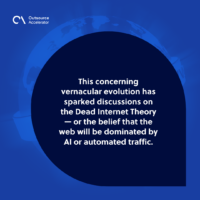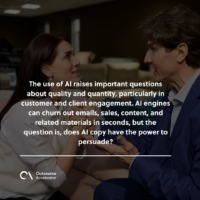Dead Internet Theory
Increasing human dependency on artificial intelligence (AI) is leading to missed opportunities, which ultimately hamper business performance.
OpenAI CEO Sam Altman has said that humans are beginning to adopt AI-like language, whether in their writing or speech. The way people communicate is influenced by what they hear or read. Given that AI has been deeply integrated into our devices, it’s only natural that we pick up certain language traits.
This concerning vernacular evolution has sparked discussions on the Dead Internet Theory — or the belief that the web will be dominated by AI or automated traffic. Articles, comments, and social media activity would all be created by AI agents. The theory posits that soon, humans will have little to no influence on shaping Internet content.
More and more businesses are utilizing AI’s ability to hasten various business processes. Much of the corporation’s success hinges on speed and efficiency, which AI is really good at. We can’t blame businesses for their enthusiasm and urgency to integrate AI into their systems.
What it means for business
However, the use of AI raises important questions about quality and quantity, particularly in customer and client engagement. AI engines can churn out emails, sales, content, and related materials in seconds, but the question is, does AI copy have the power to persuade? Can they attract new customers or re-engage with former ones? Can AI copy turn into actual sales? Can it build and maintain healthy customer relationships?
Firms are flooding the web with all sorts of AI-generated content, from sales pitches, calls to action, and newsletters. It has become so easy that they often set aside reviewing the bot’s output, focusing instead on producing as many as they can.
This could only lead to information overload and surface-level content, which can adversely affect the trust between the business and its clients. Losing customer confidence could immediately translate into poor traffic and low revenues.
AI is not a crutch but a tool. It can help get things done, but we should be able to exist without it. It seems like a counterintuitive philosophy given how deep we are in the tech age. But in a world increasingly filled with AI-generated content, there arises an opportunity to be more daring — to stand out. And that can only be accomplished by utilizing human creativity and compassion.
The human contribution
In the customer service segment, people still prefer human interaction over bots. Some go through tedious verification efforts just to confirm they’re talking to an actual human agent. This is solid evidence that a market still exists where people want to build authentic relationships.
Instead of incessantly tweaking AI prompts, why not create personalized marketing spiels? Rather than using a monotone AI voice in video promotions, why not record a human voice? Instead of letting a bot respond to inquiries, why not let an experienced human staff member take care of it?
Businesses must take this time to refine their storytelling to allow their brand’s identity to stand out. While competition is busy churning out generic AI content, humanizing business activities may just be the trick to stick out in a world increasingly saturated with robots.
The question for your business
How do you add ‘human value’ to your business?





 Independent
Independent





















